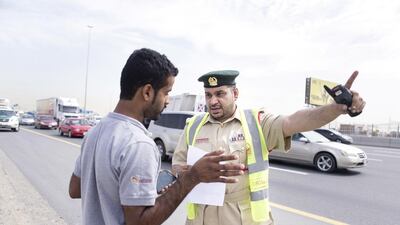DUBAI // Drivers who use mobile phones behind the wheel, tailgaters and street racers are among the biggest frustrations for traffic police.
Maj Salah Al Hammadi, of Dubai Police Traffic Department, says eliminating mobile phone use while driving is his top priority, and he welcomes provisional plans for such offences to be met with harsher penalties.
“Many accidents could be prevented if we stopped people using mobiles when driving,” he says. “It is the most dangerous thing.”
Maj Al Hammadi was speaking out in the week it was revealed that 10 per cent of the 100,000 traffic fines issued in Abu Dhabi in the first three months this year were for people using mobiles while driving. Of the tickets issued, 14,000 were for people driving at more than 60 kilometres an hour above the speed limit.
Using a mobile while driving merits four black points and a Dh200 fine, which could rise fivefold under new recommendations. The Federal Traffic Council wants to increase penalties, but it is not yet law.
Maj Al Hammadi says people mentally switch off when using a mobile. “Suddenly, they look up and think, ‘how did I get from Jumeirah to Deira?’,” he says.
Last year, an average of 136 people a day were caught driving while on the phone in Dubai alone, and 140 people were caught speeding by radar while using their phones.
Dubai Police recorded 49,643 cases last year of people using their mobile phones while driving, an increase from 45,499 in 2014 and 35,734 in 2013.
Lt Easa Ahmed Suwari says rubbernecking – motorists slowing down or turning round to see the aftermath of a car crash – is also a huge problem. “The scariest incidents are when they grab their phone for a picture when they see a patrol car,” he says.
“When we see that, we take them to the police station, because there is a fine for driving dangerously and also the issue of breaching the privacy of the police.”
But the traffic offence that most frustrates Lt Suwari is tailgating. He says a five-metre gap – about one car length – was needed for a driver to stop if the car in front suddenly braked.
Despite dozens of patrol cars, motorbikes and undercover vehicles being on the roads at any one time, many motorists still ignore repeated warnings given by police, Lt Suwari says.
He and Lt Mohammad Al Badwawi have worked with the traffic department for almost 20 years and 14 years respectively, and both remain frustrated by seeing motorists continue to risk their lives and those of others by not taking care.
For Lt Al Badwawi, illegal street racing is one of the traffic police’s greatest concerns. Several undercover cars work constantly to catch drivers not obeying the law. Their main target is street racers who emerge at night, with Al Mamzar Beach being a hotspot.
Lt Al Badwawi says these racers use modified performance cars manipulated to sound louder and accelerate quicker.
“These cars are not noisy in the factory, but are very noisy when driven on the roads,” he says.
Another tool of the traffic department is education, with officers often going to labour camps to educate workers on the safest way to cross busy roads.
As Lt Suwari says, seven workers were killed crossing motorways in the first three months of this year, compared with just three for all of last year.
______
For more:
› Life of a Dubai traffic cop is anything but average
› Dubai traffic officers opt for friendly approach with offenders, as safety is top priority
› Dubai traffic police to have eyes in the backs of their heads
› A day in the life of a Dubai traffic police officer - in pictures
newsdesk@thenational.ae

